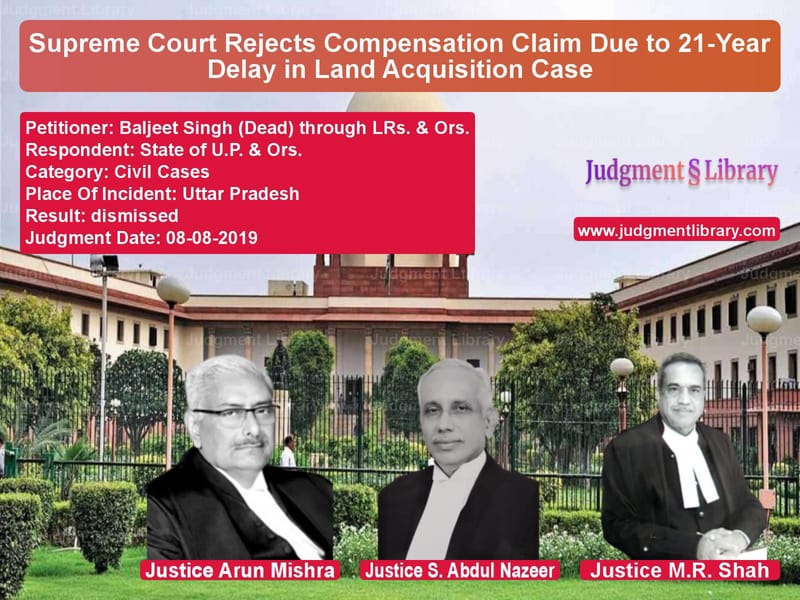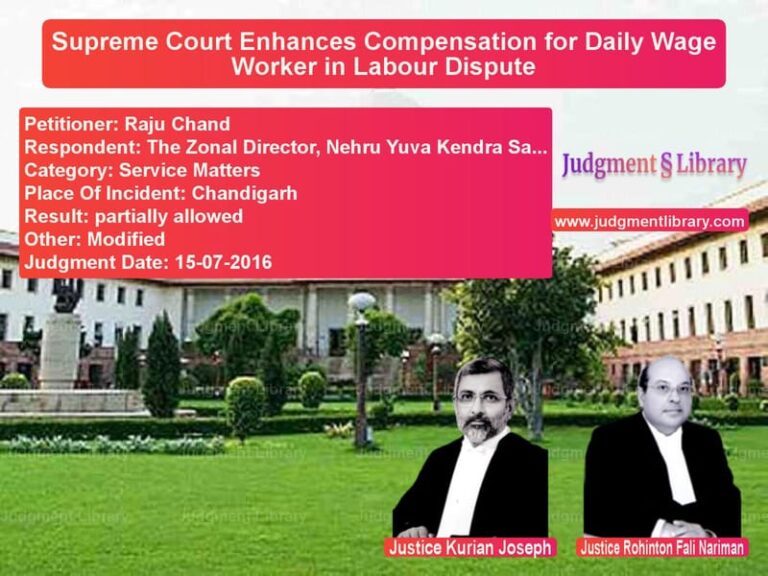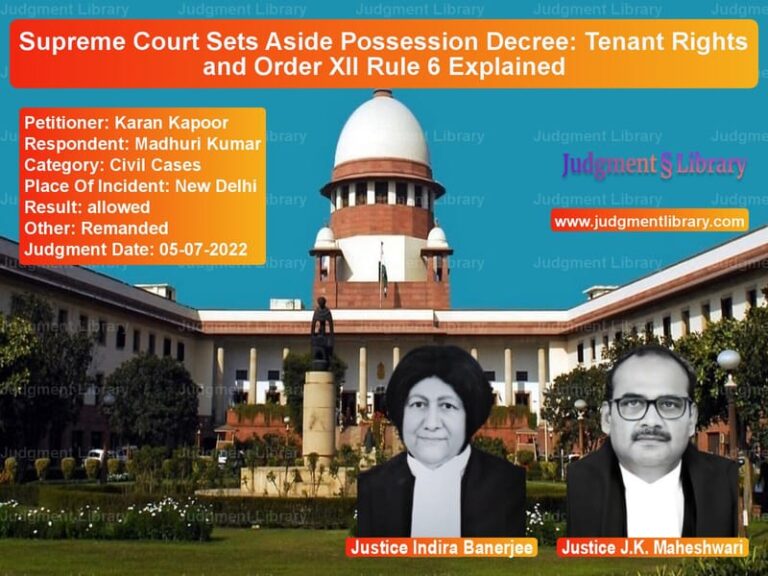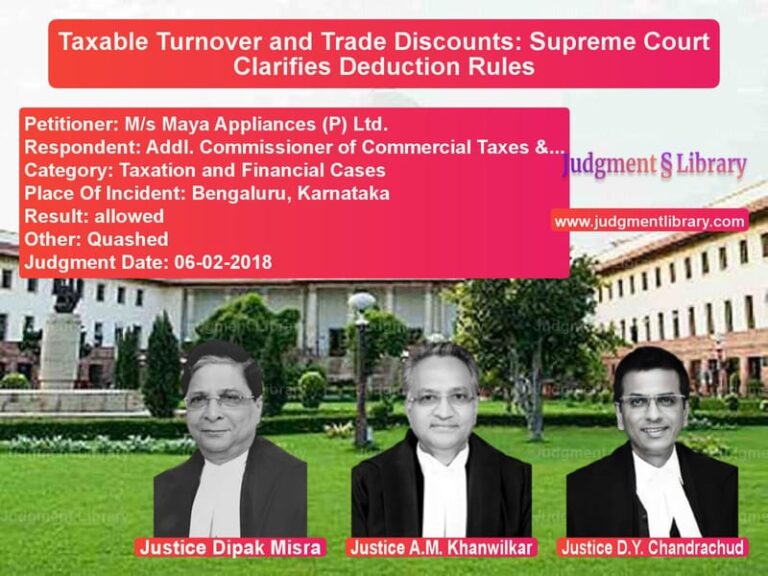Supreme Court Rejects Compensation Claim Due to 21-Year Delay in Land Acquisition Case
The Supreme Court of India, in its judgment dated August 8, 2019, ruled on a significant case involving compensation claims in a land acquisition dispute. The case, Baljeet Singh (Dead) through LRs. & Ors. v. State of U.P. & Ors., dealt with the issue of whether landowners could seek enhanced compensation after an extraordinary delay of 21 years. The Court dismissed the petitions, emphasizing that excessive delay in approaching the court undermines the principles of finality and judicial efficiency.
Background of the Case
The case involved the acquisition of land in the villages of Gulsitapur and Tilpta, Uttar Pradesh. The government had acquired the land in 1985 for industrial development, and the compensation was initially fixed at Rs. 8-10 per square yard. The landowners sought higher compensation, leading to a reference under Section 18 of the Land Acquisition Act. In 1993, the Reference Court increased the compensation to Rs. 30 per square yard.
However, in 1996, the Allahabad High Court reduced the compensation to Rs. 22.20 per square yard. The landowners did not challenge the High Court’s decision at that time. Instead, they filed special leave petitions (SLPs) before the Supreme Court in 2017, nearly 21 years later, seeking compensation parity with another village (Kasna), where compensation had been fixed at Rs. 65 per square yard.
Petitioner’s Arguments
The petitioners contended:
- Unfair Compensation: The land in Gulsitapur and Tilpta was similarly situated to that of Kasna and should have been awarded the same rate of Rs. 65 per square yard.
- Right to Fair Compensation: Landowners whose property is compulsorily acquired should not be deprived of just and fair compensation.
- Delay Should Not Deny Justice: The delay should not be a barrier to ensuring equitable compensation, as land acquisition affects the livelihood of farmers.
- Precedents Supporting Delay Condonation: Cited earlier Supreme Court rulings where delay was condoned in similar cases.
Respondent’s Arguments
The respondents, including the Uttar Pradesh State Industrial Development Corporation (UPSIDC) and Greater Noida Industrial Development Authority, strongly opposed the plea, arguing:
- Unjustifiable Delay: There was no reasonable explanation for why the petitioners waited 21 years to challenge the High Court ruling.
- Doctrine of Acquiescence: The petitioners had accepted the compensation awarded in 1996 without objection, implying they had no grievance.
- Irreparable Administrative Impact: Granting compensation at par with a different village would set a precedent leading to a flood of similar claims.
- Financial Burden: The enhanced compensation, if awarded after such a long time, would place an undue financial burden on the state and development authorities.
Supreme Court’s Observations
The Supreme Court, led by Justices Arun Mishra, S. Abdul Nazeer, and M.R. Shah, made several key observations:
1. Excessive Delay Cannot Be Ignored
The Court held that a delay of over two decades is unacceptable in litigation and noted:
“No sufficient cause has been shown to condone the huge delay of approximately 21 years. Such an inordinate delay, if allowed, would disrupt the entire judicial process.”
2. Finality of Judicial Decisions
The Court stressed that legal decisions, once accepted and not challenged in a reasonable timeframe, attain finality:
“The petitioners cannot be allowed to re-open the matter after such a prolonged period merely because they found a new legal ground to claim parity.”
3. Doctrine of Acquiescence
The Court found that the petitioners had never objected to the High Court’s ruling for 21 years, demonstrating acquiescence:
“If a party does not exercise its right for an extended period, it amounts to an acceptance of the judicial order.”
4. Developmental Concerns
The Court acknowledged the impact of land acquisition on economic and infrastructural development:
“Once land is acquired, developed, and allotted, retrospective enhancement of compensation would unfairly burden the state and development agencies.”
Final Verdict
The Supreme Court dismissed the special leave petitions, ruling:
- The delay of 21 years in filing the petitions was inexcusable.
- The petitioners had accepted compensation and did not challenge the High Court ruling in a timely manner.
- Granting enhanced compensation after such a long time would set a dangerous precedent.
- The petitions were barred by the doctrine of laches and acquiescence.
Impact of the Judgment
This ruling reinforces crucial legal principles regarding delays in litigation:
- Judicial Finality: The verdict strengthens the doctrine that court judgments cannot be reopened indefinitely.
- Time-Bound Legal Challenges: Citizens must approach courts within a reasonable timeframe to claim their legal rights.
- Protection of Government Resources: Retrospective compensation claims after extensive development activities cannot be entertained.
Conclusion
The Supreme Court’s ruling in Baljeet Singh (Dead) through LRs. v. State of U.P. serves as a landmark precedent against excessive litigation delays. The judgment ensures that once compensation is accepted and legal proceedings attain finality, reopening cases after decades is neither legally permissible nor administratively viable. The case underscores the importance of timely legal challenges and strengthens the principles of finality and judicial efficiency.
Petitioner Name: Baljeet Singh (Dead) through LRs. & Ors..Respondent Name: State of U.P. & Ors..Judgment By: Justice Arun Mishra, Justice S. Abdul Nazeer, Justice M.R. Shah.Place Of Incident: Uttar Pradesh.Judgment Date: 08-08-2019.
Don’t miss out on the full details! Download the complete judgment in PDF format below and gain valuable insights instantly!
Download Judgment: Baljeet Singh (Dead) vs State of U.P. & Ors. Supreme Court of India Judgment Dated 08-08-2019.pdf
Direct Downlaod Judgment: Direct downlaod this Judgment
See all petitions in Property Disputes
See all petitions in Damages and Compensation
See all petitions in Landlord-Tenant Disputes
See all petitions in Judgment by Arun Mishra
See all petitions in Judgment by S. Abdul Nazeer
See all petitions in Judgment by Mukeshkumar Rasikbhai Shah
See all petitions in dismissed
See all petitions in supreme court of India judgments August 2019
See all petitions in 2019 judgments
See all posts in Civil Cases Category
See all allowed petitions in Civil Cases Category
See all Dismissed petitions in Civil Cases Category
See all partially allowed petitions in Civil Cases Category







